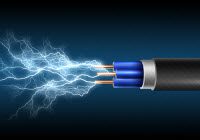Category: Electrical Safety
Electrical hazards can cause burns, shocks and electrocution (death). OSHA’s design safety electrical standards apply to systems that provide power and light to employee workplaces. These regulations cover electrical installations and equipment installed or used within or on buildings, structures, and other premises. OSHA’s safe work practice rules for electricity provide standards for both qualified employees (those with a specific level of training) and unqualified employees (those with little or no training) who work on, near, or with various electrical components.
By Ana Ellington, Legal Editor A number of OSHA standards are cited in relation to arc flash hazards. The NFPA 70E national consensus standard is a comprehensive standard that contains detailed information on how to protect workers from arc flashes. Employers must consider and adopt NFPA 70E when employees work on an electrical system. NFPA […]
By Ana Ellington, Legal Editor An arc flash is an undesired electric discharge that travels through the air between conductors or from a conductor to a ground. The flash is immediate, but the result of these incidents can damage equipment and cause severe injury, including burns. According to the National Fire Protection Association (NFPA) 70E […]
Yesterday, we presented answers to a number of important questions about electrical safety. Today, we review some more electrical safety FAQs. What is the best way for employees to protect against electrical hazards? Most electrical accidents result from one of three factors: Unsafe equipment or installation Unsafe environment Unsafe work practices Accidents and injuries can […]
In today’s Advisor we focus on some frequently asked questions about electrical safety, with answers provided by OSHA. What causes electrical shocks? Electricity travels in closed circuits, normally through a conductor. But sometimes a person’s body—an efficient conductor of electricity—mistakenly becomes part of the electric circuit. This can cause an electrical shock. Shocks occur when […]
Do you have a plan for when the power goes out unexpectedly? You should. A power outage can amount to much more than just a brief inconvenience. It can create safety issues that workers may not recognize unless they have been told to expect them. Consider these questions to identify and plan for possible hazards […]
Beware counterfeit products that could cause electrical accidents in the workplace. What are the most frequently counterfeited products in the world? Rolex watches? Louis Vuitton wallets? Try Viagra. In a close second place, though, and of much greater concern for workplace safety experts, are electrical products and components. More than 1 million counterfeited electrical products […]
Today, we take a look at extension cord safety with some training pointers for your employees, brought to you courtesy of our featured safety training product, 7-Minute Safety Trainer. Extension cords are such a common item in the workplace and in the home, that many people take them for granted and fail to realize that […]
Today, we review some training points for preventing electrical accidents. These points should be covered in electrical safety meetings with all employees. The following training points are brought to you courtesy of today’s featured BLR safety training product, 7-Minute Safety Trainer. Shock Prevention Inspect electrical equipment before use to be sure insulation is in good […]
Electrical incidents might not happen as often as some other types of workplace accidents, but when they do, they can be fatal. Make sure your electrical systems meet the requirements for safeguarding employees. U.S. OSHA’s electrical safety rules for general industry workplaces (29 CFR 1910, Subpart S) cover electrical safety requirements that are necessary for […]
Manage electrical hazards successfully with these 10 tips for keeping workers safe from shocks, burns, and electrocution. Jim White, training director for Shermco Industries, Inc., a Dallas-based electrical power systems test and maintenance company, has developed a list of 10 electrical safety tips for keeping workers safe. 1. Develop a zero-tolerance policy toward energized work. […]




